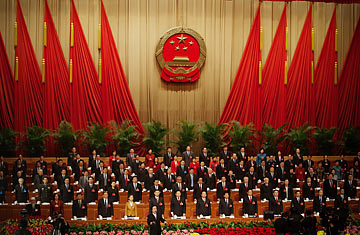
The third session of the 13th Beijing People's Congress
(2 of 2)
Widen your perspective: take into account what's happening in Asia outside of China, and the message from the East looks starkly different. The problem with today's analysis of Asia is that it is far too focused on China. China is not Asia. In fact, in many ways, it is the exception (albeit a big one). Asia's other giant outperformer — India — is a quite fractious democracy. Only one significant economy — Vietnam — is following China's lead. Just about everywhere else, policymakers are rejecting the China model. The severity of the financial crisis hasn't caused political leaders to look to China's success and roll back democracy or copy China's state capitalism. In fact, they are heading in just the opposite direction. The Presidents of South Korea and Taiwan believe deregulation is crucial for the future of their economies. In Japan, newly installed Prime Minister Yukio Hatoyama has wisely made weakening the power of the bureaucracy — not expanding it — one of his primary policy goals. Asia has also become a leader in promoting free trade, as a proliferation of free-trade associations (FTAs) continues to push back the power of the state. India, another country fingered as a state capitalist, inked landmark FTAs last year with South Korea and the 10-member Association of Southeast Asian Nations (ASEAN).
Even in China, autocratic state capitalism has an uncertain future. The story of Asia's economic boom tells us that democracies tend to follow wealth. Asians have demanded more political rights with their expanded economic opportunity. That's what happened in Taiwan, South Korea and Indonesia, all dictatorships turned stable democracies. China believes it can build a full-fledged market economy while leaving its politics unchanged. So far it has. But as China gets richer, can its ruling class survive the forces that undermined autocratic regimes elsewhere in Asia?
The same can be asked about the state role in its economy. The evidence from Asia shows that its economies became more market-driven as they became more advanced. That's been true in China as well. Despite all the talk of state capitalism, Beijing's leaders continue to liberalize the economy. In January, a free-trade agreement between China and ASEAN came into full effect, creating a free-trade zone with more potential customers than NAFTA. China's State Council also approved the very capitalist practices of short selling of stocks and futures trading. The big question about China-style state capitalism is not whether other nations should mimic it to compete in a changing world economy. The real issue is whether China's state capitalism can withstand the pressures imposed by a changing world economy.
Asia's economic strength is not a result of some ancient Chinese secret or a special economic model that Americans must copy to survive. It owes to simple, old-fashioned, free enterprise, the kind Americans love to love. The "democratic capitalism" being questioned in the U.S. is finding new roots in a rising Asia. If Americans want to learn the correct lessons from Asia, they can ironically find them right at home.
